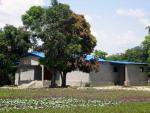Project Medishare Makes Progress on Nutrition Training Complex
 Project Medishare has been operating on Haiti's Central Plateau since 1995. Working with community groups, the Haitian Ministry of Health, Partners in Health, and the Green Family Foundation, Project Medishare has dramatically improved the health infrastructure of Thomonde and sorrounding areas. Construction is proceeding on their latest and most innovative project - a Nutrition Training Complex with three components: (1) An AK-1000 processing facility; (2) A treatment center for malnourished children; and (3) An education and training center. This community-driven approach will promote children's health and bolster the local ecomomy at the same time.
Project Medishare has been operating on Haiti's Central Plateau since 1995. Working with community groups, the Haitian Ministry of Health, Partners in Health, and the Green Family Foundation, Project Medishare has dramatically improved the health infrastructure of Thomonde and sorrounding areas. Construction is proceeding on their latest and most innovative project - a Nutrition Training Complex with three components: (1) An AK-1000 processing facility; (2) A treatment center for malnourished children; and (3) An education and training center. This community-driven approach will promote children's health and bolster the local ecomomy at the same time.
You are probably wondering what AK-1000 is. AK-1000 is simply the generic name for a mixture containing two parts cereal and one parts red beans. It comes from the word “Lacassan", a hot gruel that Haitains make with corn flour. Laccassan is often abbreviated as “AK-100” in advertisements or by merchants who sell it. The name AK-1000 was chosen because it was said to be ten times more nutritious.
AK-1000 is not a new innovation. In the late 1960s, a team associated with Haiti’s Bureau de Nutrition, directed by Dr. William Fougere, undertook a scientific studies of Haitian cereal/bean mixtures in Haiti with the help of Virginia Polytechnique Insitutue. The team was looking for an ideal “weaning food” that met four criteria: First, it has to be a good nutrition product for pre-school children that would be 10 – 20% high quality protein. Second, it had to be made exclusively of local agricultural products. Third, it had to be simple enough that it could be produced locally. Finally, it needed to be inexpensive enough that it was affordable. Over the course of six years, AK 1000 was developed, field tested, and proven against these criteria in several different settings.
There are two challenges that have kept AK-1000 from being used more widely - a short shelf life and long preparation time. This facility incorporates a new production method that precooks and dry the product. This decreases the amount of time needed to cook the meal and adds months to the shelf life. Akamil will be sold at an affordable price and be provided for free to those who are unable to buy it on their own.
Thanks to a generous contribution from Nick Caporella, Project Medishare was able to begin construction of the Nutrition and Training Complex in May 2007. Construction is proceeding well, although building anything in rural Haiti is always a time consuming process. There is very little heavy equipment in the Central Plateau so all construction is done with hand tools. The community has been very supportive. A local family provided 4 acres for the construction of the facility. Although 175 people are formally employed in the construction process, a large number of volunteers are assisting.
When the processing plant is completed (target date: end 2008), the focus will shift to the completion of the training center. The training center will have a conference room with satellite internet, offices for the administration of community health programs, and lodging for visiting medical and public health professionals. The center will be the nutrition education site for all health workers in the Central Department.
When the Treatment Center is completed, it will provide life-savng care for acutely malnourished children in full collaboration with the Thomonde medical facility. The Center will offer follow-up care and referral as needed. In addition to treating children who are malnourished, the Center will coordinate education and outreach efforts to prevent children from becoming malnourished in the first place.
The Nutrition and Training Complex will have a significant impact on the local economy as well. The raw agricultural products needed to create AK-1000 will employ an estimated 3,000 farmers in the region. 29 individuals will be employed full time to manage the Complex and its different activities.
As Project Medishare has grown, so too has its impact. While it will always have a community focus, the organization is increasingly having a regional impact. Partnerships are key to Project Medishare's success. One promising new partnership is with CDC's International Micronutrient Malnutrition Prevention and Control Program (IMMPaCT) whose staff have agreed to help evaluate the implementation of the AK-1000 rollout. Other partners include Universities, Foundations, Non-Governmental Organizations and private sector companies.
For more background on the region, take a look at the Haiti Central Plateau site. If this project resonates with you, there are many ways to get involved. One way to help is by raising awareness about the Nutrition and Training Complex and why it is important. Another way to help is by holding a fundraiser or making an online donation here. If you are a medical student, public health student or faculty member at a University, there are numerous opportunities for collaboration including volunteering.
Supporting Project Medishare is one way to make a tangible improvement on the ground in Haiti, particularly during this period of increased food inescurity. If you would like further information, please feel free to contact me.
Thanks!
Bryan
Add new comment